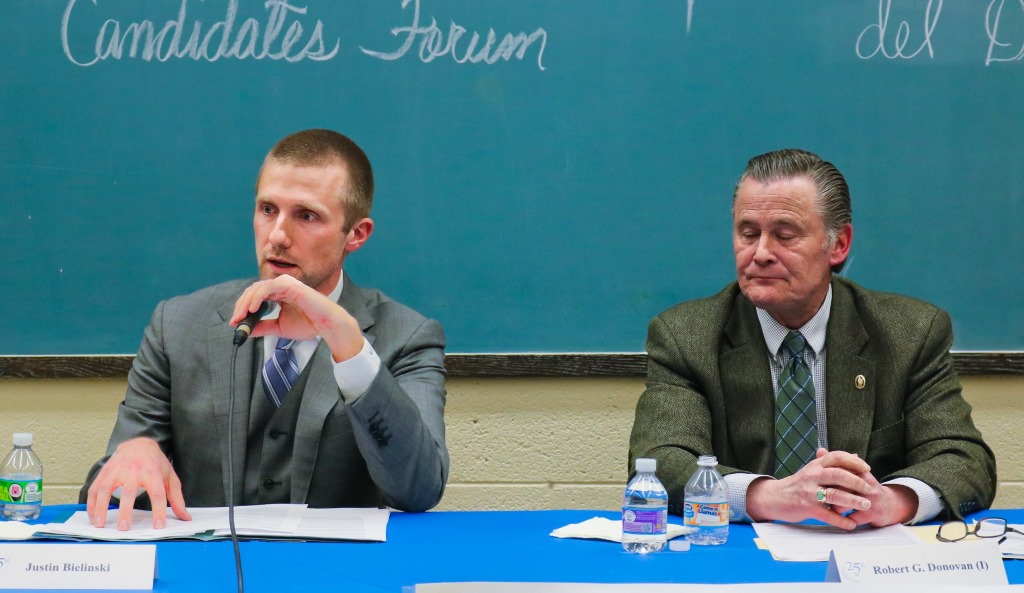What I Learned Running for Alderman
Justin Bielinski reflects on his razor-thin loss to Ald. Bob Donovan.
It was the day after the 2016 spring election. A gloomy, chilly Wednesday not unlike those I’d spent campaigning door-to-door for the past 14 months. I had bought a Brewers ticket before the election because I knew that, win or lose, I’d need some time to clear my head when it was over, and baseball, with its slow pace, is a great way to do that.
I parked my car in the usual place near the Urban Ecology Center and walked across the Valley Passage to the game. I have been to hundreds of games in my lifetime, but this one was different. I felt a little distant from it all, the players looked farther away, the crowd more subdued, like I was listening to the game on the radio, only Bob Uecker was nowhere to be found.
After it was over, I passed several of the houses I had visited as a candidate. Suddenly, it occurred to me that I wouldn’t be knocking on these doors again for quite some time. What had started as numbness in an instant became a tidal wave of emotion. The streets I had seen for over a year as my extended home now appeared to me as foreign territory, the houses that lined them the gravestones of a failed campaign.
It is difficult to accept losing in any endeavor, much less one I put my heart and soul into for so long. Since the race ended, I’ve experienced every stage of grief in one form or another, often with unexpected triggers at unexpected times. A part of me feels missing, my identity having been defined as “political candidate” for so long. To lose that has left me feeling a bit lost.
All of this being true, I still wouldn’t trade the experience for anything. How could this be? Here are a few of the reasons:
1) There is no feeling like the one you get after a successful election. When I beat my state representative by a three-to-one margin in the primary, the validation I felt for all the hard work can not be overstated. That hundreds of people took time out of their day to talk to me or help me so that I might represent them in elected office is humbling and gratifying at the same time.
2) You will never meet more diverse and interesting people. One woman threatened to call the police when she found out I was running against Donovan. One woman answered the door with no shirt, and one man answered with no pants. One gentleman was unemployed and worried about losing his house, but insisted on offering me a bottle of water while we spoke on his porch. One woman burst into tears as we spoke because she had witnessed a homicide earlier in the week. Most people were very nice, some even offered me dinner. I had so many great conversations and met so many great people who I never would have known if I had not run for office.
4) You will never feel more sure of your purpose in life. When I declared myself a candidate, it meant there was no more work life and personal life. Suddenly everything was about the campaign. There are drawbacks to this to be sure (more on those later), but there are definite advantages. Every morning I woke up with a specific goal. Most of these goals involved knocking on doors. By the later stages of the campaign, when I had quit my job to run for the seat full-time, I was averaging about 110 doors per day. Toward the end, it was closer to 180. Of every 100 doors, I was lucky if 20 of them answered. It seemed like every day of doors offered at least one incredible conversation, and that’s what kept me going on cold days, even when the temperature hit zero.
There are alwo drawbacks to running for office:
1) People begin to question your character. Before I ran for alderman, nobody questioned whether or not I was a good person. I’d worked with children and adolescents for almost 15 years, I had never been arrested, most of my breakups were amicable, I had a small core of friends that seemed to enjoy my company, and I married an incredible woman who I respect and admire like no other. Then I became a candidate. Suddenly people looked at me with suspicion, even scorn. What was I really after? What did I want that I wasn’t saying? Who did I know who was pulling the strings? It was quite a shock to the system, but I as I learned, it’s all part of the process.
2) You no longer have a personal life. Every weekend you have one plan: knock on doors. Every evening you have one goal: find an in-district event if possible, or else a political one where you can network and prospect for potential allies/campaign donors. That concert you want to go to, that vacation you want to take? Those just have to wait. I did manage one regular non-campaign commitment. I played soccer one evening or one morning per week on an over-30 team called Los Lobos. Other than that, it was pretty much all campaign, all the time.
3) Your relationship with social media changes. Namely, you can no longer say no to most friend requests, and everything you post must meet certain standards. Avoid controversial posts, avoid over-posting, and find out when your social media followers are most likely to be online to maximize your audience. Whether you realize it or not, everything you post, even on a “personal” page, becomes part of your brand, and you’d better make sure that brand is palatable to a wide audience.
4) If you’re running against an incumbent, you’re essentially on your own. In my case I was running against two incumbents, including the state rep looking to switch offices. How does that work? The people who encouraged you to run when you were “thinking about it?” They will disappear. All the political friends you thought would be in your corner? They’ll “wait and see.” All the organizations you were sure would endorse you? They’ll wait until after the primary. There were three exceptions to this in my race, and they know who they are. I will be forever appreciative of their support. Besides these exceptions, the only support you can count on are your close friends, your family, and the voters you meet on the campaign trail with whom you really connect. I was fortunate enough to have many of these people become volunteers in my campaign, and I’ll never forget their contributions. In fact, I’m proud to call them my friends.
So would I do it again? Absolutely. It’s only a matter of when.
Political Contributions Tracker
Displaying political contributions between people mentioned in this story. Learn more.























I hope that you will run for office again. I appreciated the energy and dedication you’ve shown, and you did something a lot of people considered unlikely–you came within a narrow margin of beating a long-time entrenched incumbent. To do so in a year when record numbers of conservative voters were coming out of the woodwork to vote in the GOP Prez primary (and to likely vote in turn for your opponent too) is remarkable. I think you can win that race, or perhaps a different one, in the future.
Thanks again!
Nice article.
It’s a shame that this aldermanic race, and most of them, essentially got no coverage of issues by the Journal Sentinel (and not all that much in Urban Milwaukee either). Alderpersons make incredibly crucial decisions about our city and the races were only covered by JS politics columnist Dan Bice if there was juicy gossip. If there was no gossip about a sincere, dedicated candidate (Bielinski and others) they got no mention. TMZ journalism reigns!
The JS went out of its way to make sure Donovan’s antics were analyzed in his mayoral run but barely mentioned he was also fighting to retain his aldermanic seat. No wonder there were so many under-votes in this and other races.
Keep plugging away, Justin. We change agents like you trying to figure out how to make their neighborhoods and the whole city better.
Thanks for the kind words, everyone. I certainly wish our paper of record would cover issues in local campaigns, rather than whose staffer quit, what outrageous thing was said, etc. I appreciate outlets like Urban Milwaukee and Neighborhood News Service, and even the Shepherd for providing more of that in-depth coverage.